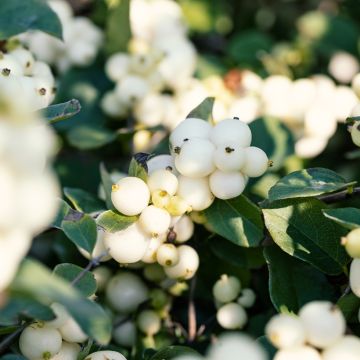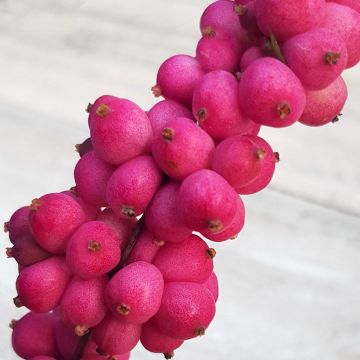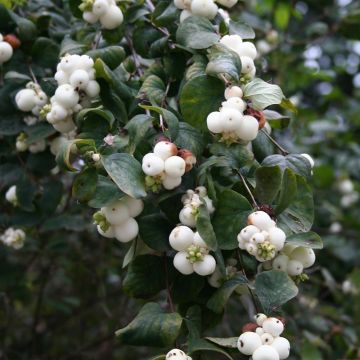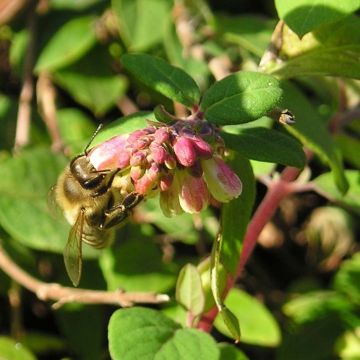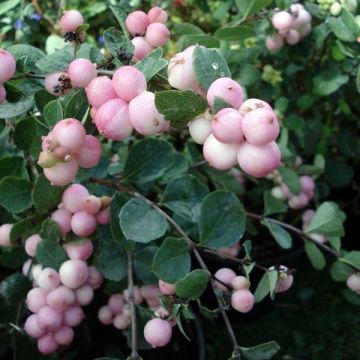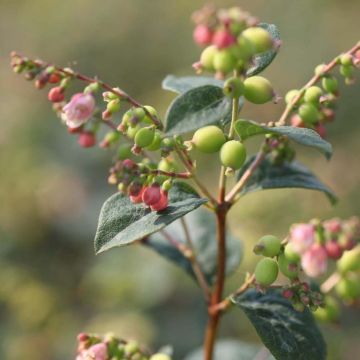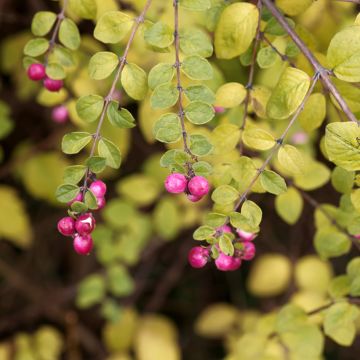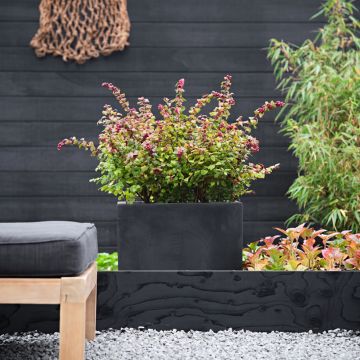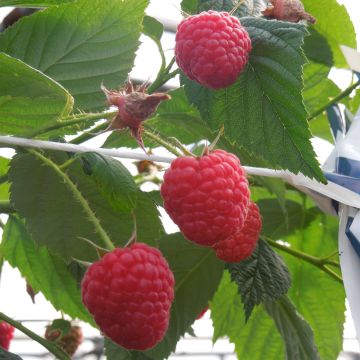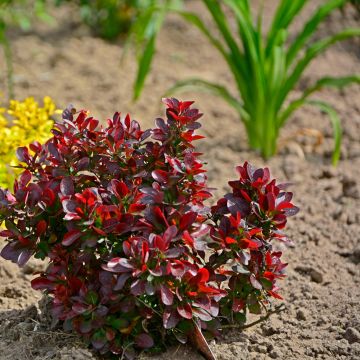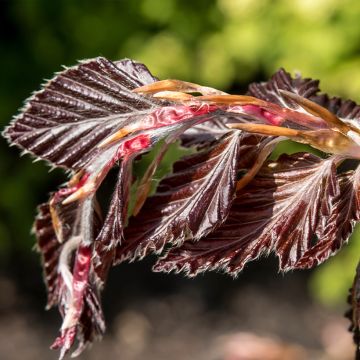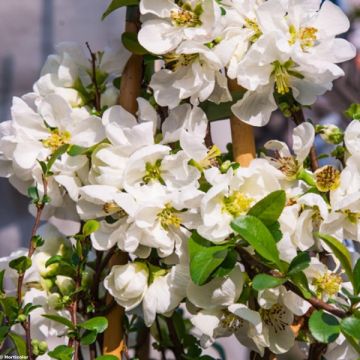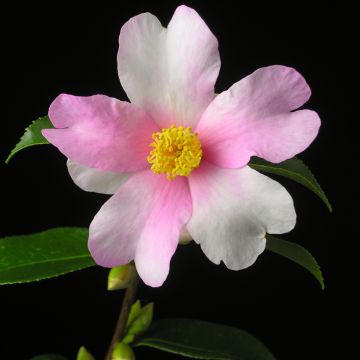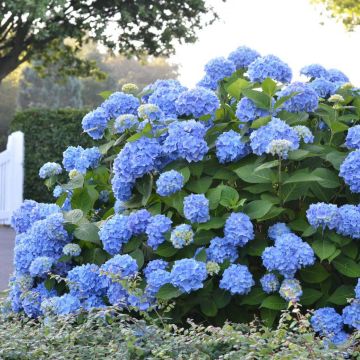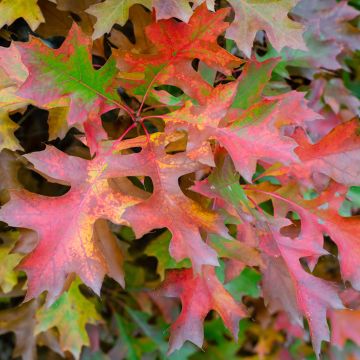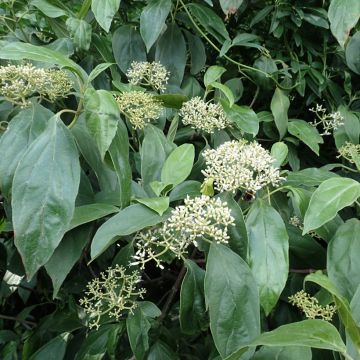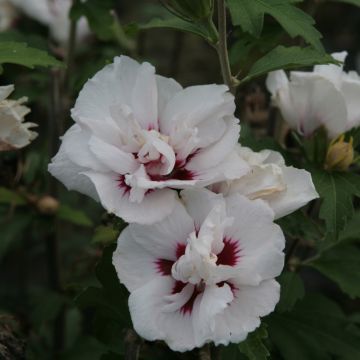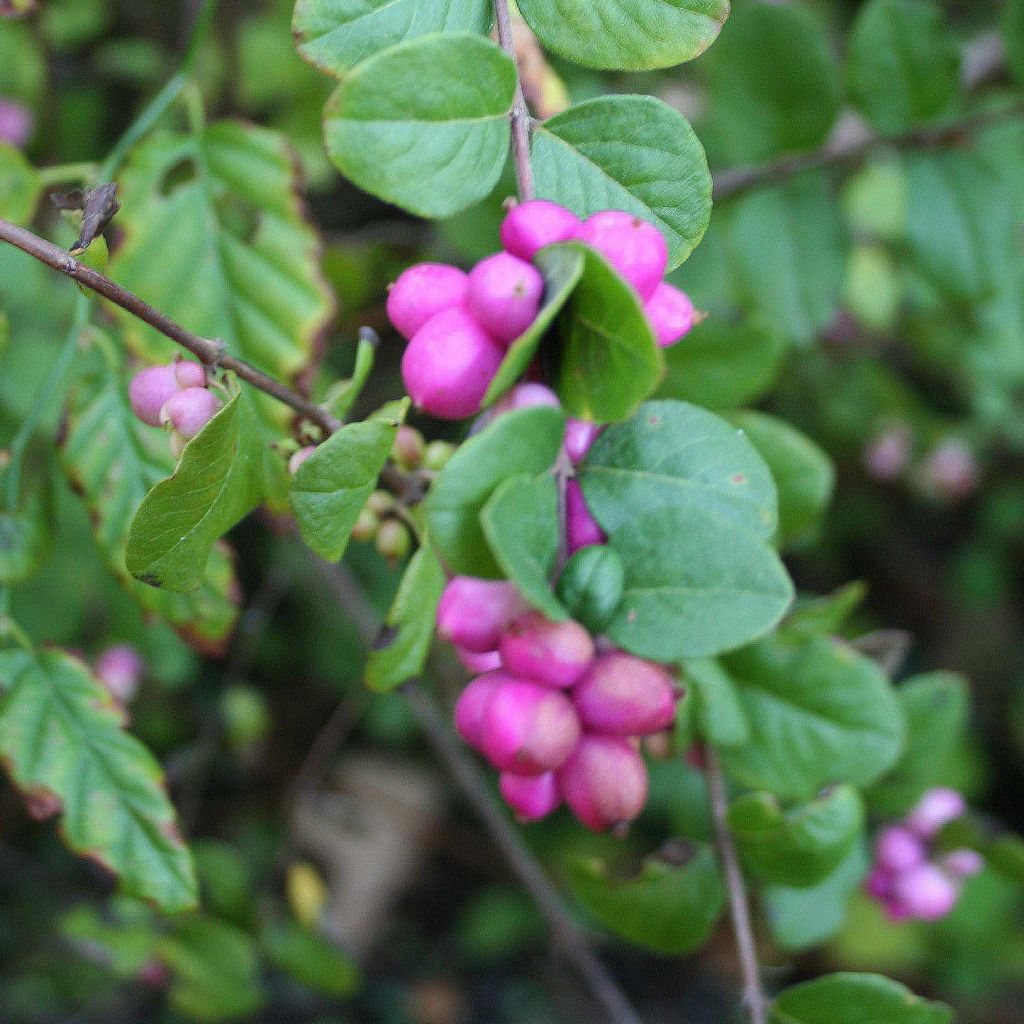

Symphorycarpos doorenbosii Magic Berry
Symphorycarpos doorenbosii Magic Berry
Symphorycarpos x doorenboosii Magic Berry
Snowberry
This item cannot be shipped to the selected country
Delivery charge from €5.90
Delivery charge from €5.90
More information
Schedule delivery date,
and select date in basket
This plant carries a 24 months recovery warranty
More information
We guarantee the quality of our plants for a full growing cycle, and will replace at our expense any plant that fails to recover under normal climatic and planting conditions.
From €5.90 for pickup delivery and €6.90 for home delivery
Express home delivery from €8.90.
From €5.90 for pickup delivery and €6.90 for home delivery
Express home delivery from €8.90.

Does this plant fit my garden?
Set up your Plantfit profile →
Description
Symphorine or Symphoricarpos 'Magic Berry' is a small deciduous bush that is easy to grow and very fruitful, which will be appreciated at the end of the season for its abundant and unique fruiting, almost multicoloured, which often persists on the branches until the heart of winter. A discreet pink spring flowering is followed by a profusion of small round berries, coloured red, violet, pink and even white-pink depending on the sides. 'Magic Berry' finds its place in a small informal hedge, in a large bed of plants, or even on a rockery, on a slope. This symphorine can also be displayed in a large pot on the terrace to be admired, animated by the incessant ballet of birds, warm behind a window.
Symphoricarpos x doorenbosii is a plant of the Caprifoliaceae family resulting from the crossbreeding between Symphoricarpos albus var.laevigatus, native to the eastern Rocky Mountains in the U.S.A, and S.chenaultii, a hybrid of horticultural origin.
It is a deciduous bush with sucker roots, fast-growing. Reaching about 1.20m (3ft 11in) in height at maturity, it spreads laterally without theoretical limit. Its habit is generally rounded, dense and compact, supported by upright, well-branched stems that arch over time. The foliage, deciduous, is composed of small ovate leaves measuring 2 to 4cm (0.8 to 1.6in) long. Dark green on the top, they are lighter on the underside and turn yellow before falling. The flowering, discreet to human eyes, attracts pollinators. It takes place in May-June, in the axil of the leaves, in the form of clusters of small pink bells. After pollination, they give way from August to small round and spongy fruits measuring 1.5 to 2cm (0.6 to 0.8in) in diameter tinged with red on the side exposed to the sun, but light pink, or even white slightly shaded with pink on the shaded areas of the fruit. These berries, which are the distinctive feature of the bush, often persist until December. Inedible for humans, they are, however, appreciated by birds and game.
This 'Magic Berry' symphorine is a resistant and extremely hardy bush, capable of adapting to many growing conditions, and to all our regions, including the harshness of the Mediterranean summer when planted in the shade. It easily integrates into an informal hedge or a large shrub bed without pretension, in a garden that leaves room for nature. Many other deciduous or evergreen shrubs, with flowers or berries, will accompany it: Spireas, Viburnums, lilacs, shrubby honeysuckles, Cotoneasters, Elaeagnus, botanical roses, Euonymus, ornamental cherries and apples, hawthorns, Berberis... You can even grow the 'Magic Berry' symphorine in a pot on your terrace. Its fruit-laden branches can also be used to make beautiful autumn bouquets.
Report an error about the product description
Symphorycarpos doorenbosii Magic Berry in pictures
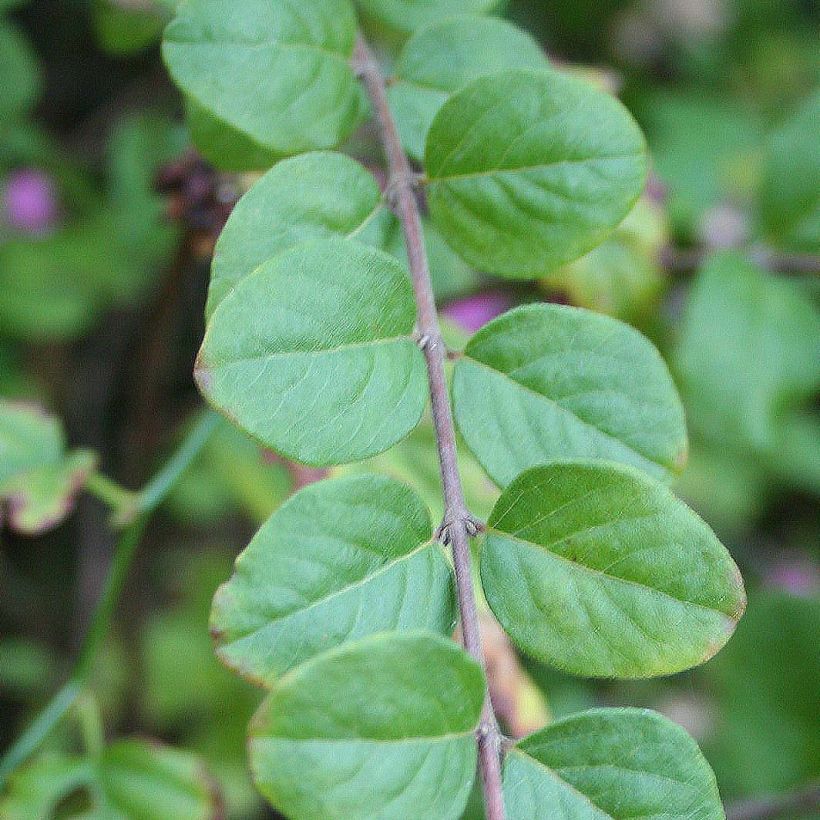

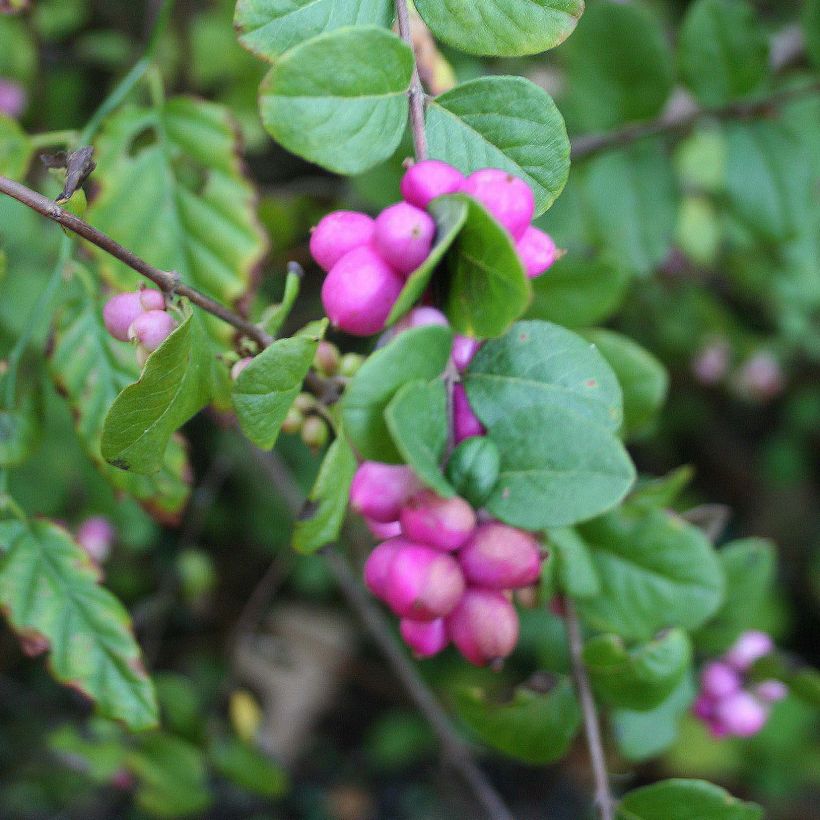

Plant habit
Flowering
Foliage
Botanical data
Symphorycarpos
x doorenboosii
Magic Berry
Caprifoliaceae
Snowberry
Cultivar or hybrid
Other Symphoricarpos
Planting and care
The 'Magic Berry' Symphoricarpos adapts to all exposures: it tolerates shade, but will be more floriferous and fruit-bearing in partial shade or non-scorching sunlight. It is a hardy and easy-to-grow bush that is suitable for any good garden soil, limestone, neutral or slightly acidic. It even accommodates wet or, conversely, dry soils in summer and is found under large trees and at the base of hedges. You can do a balance pruning at the end of winter.
Planting period
Intended location
Care
-
, onOrder confirmed
Reply from on Promesse de fleurs
Hedge shrubs
Haven't found what you were looking for?
Hardiness is the lowest winter temperature a plant can endure without suffering serious damage or even dying. However, hardiness is affected by location (a sheltered area, such as a patio), protection (winter cover) and soil type (hardiness is improved by well-drained soil).

Photo Sharing Terms & Conditions
In order to encourage gardeners to interact and share their experiences, Promesse de fleurs offers various media enabling content to be uploaded onto its Site - in particular via the ‘Photo sharing’ module.
The User agrees to refrain from:
- Posting any content that is illegal, prejudicial, insulting, racist, inciteful to hatred, revisionist, contrary to public decency, that infringes on privacy or on the privacy rights of third parties, in particular the publicity rights of persons and goods, intellectual property rights, or the right to privacy.
- Submitting content on behalf of a third party;
- Impersonate the identity of a third party and/or publish any personal information about a third party;
In general, the User undertakes to refrain from any unethical behaviour.
All Content (in particular text, comments, files, images, photos, videos, creative works, etc.), which may be subject to property or intellectual property rights, image or other private rights, shall remain the property of the User, subject to the limited rights granted by the terms of the licence granted by Promesse de fleurs as stated below. Users are at liberty to publish or not to publish such Content on the Site, notably via the ‘Photo Sharing’ facility, and accept that this Content shall be made public and freely accessible, notably on the Internet.
Users further acknowledge, undertake to have ,and guarantee that they hold all necessary rights and permissions to publish such material on the Site, in particular with regard to the legislation in force pertaining to any privacy, property, intellectual property, image, or contractual rights, or rights of any other nature. By publishing such Content on the Site, Users acknowledge accepting full liability as publishers of the Content within the meaning of the law, and grant Promesse de fleurs, free of charge, an inclusive, worldwide licence for the said Content for the entire duration of its publication, including all reproduction, representation, up/downloading, displaying, performing, transmission, and storage rights.
Users also grant permission for their name to be linked to the Content and accept that this link may not always be made available.
By engaging in posting material, Users consent to their Content becoming automatically accessible on the Internet, in particular on other sites and/or blogs and/or web pages of the Promesse de fleurs site, including in particular social pages and the Promesse de fleurs catalogue.
Users may secure the removal of entrusted content free of charge by issuing a simple request via our contact form.
The flowering period indicated on our website applies to countries and regions located in USDA zone 8 (France, the United Kingdom, Ireland, the Netherlands, etc.)
It will vary according to where you live:
- In zones 9 to 10 (Italy, Spain, Greece, etc.), flowering will occur about 2 to 4 weeks earlier.
- In zones 6 to 7 (Germany, Poland, Slovenia, and lower mountainous regions), flowering will be delayed by 2 to 3 weeks.
- In zone 5 (Central Europe, Scandinavia), blooming will be delayed by 3 to 5 weeks.
In temperate climates, pruning of spring-flowering shrubs (forsythia, spireas, etc.) should be done just after flowering.
Pruning of summer-flowering shrubs (Indian Lilac, Perovskia, etc.) can be done in winter or spring.
In cold regions as well as with frost-sensitive plants, avoid pruning too early when severe frosts may still occur.
The planting period indicated on our website applies to countries and regions located in USDA zone 8 (France, United Kingdom, Ireland, Netherlands).
It will vary according to where you live:
- In Mediterranean zones (Marseille, Madrid, Milan, etc.), autumn and winter are the best planting periods.
- In continental zones (Strasbourg, Munich, Vienna, etc.), delay planting by 2 to 3 weeks in spring and bring it forward by 2 to 4 weeks in autumn.
- In mountainous regions (the Alps, Pyrenees, Carpathians, etc.), it is best to plant in late spring (May-June) or late summer (August-September).
The harvesting period indicated on our website applies to countries and regions in USDA zone 8 (France, England, Ireland, the Netherlands).
In colder areas (Scandinavia, Poland, Austria...) fruit and vegetable harvests are likely to be delayed by 3-4 weeks.
In warmer areas (Italy, Spain, Greece, etc.), harvesting will probably take place earlier, depending on weather conditions.
The sowing periods indicated on our website apply to countries and regions within USDA Zone 8 (France, UK, Ireland, Netherlands).
In colder areas (Scandinavia, Poland, Austria...), delay any outdoor sowing by 3-4 weeks, or sow under glass.
In warmer climes (Italy, Spain, Greece, etc.), bring outdoor sowing forward by a few weeks.

































